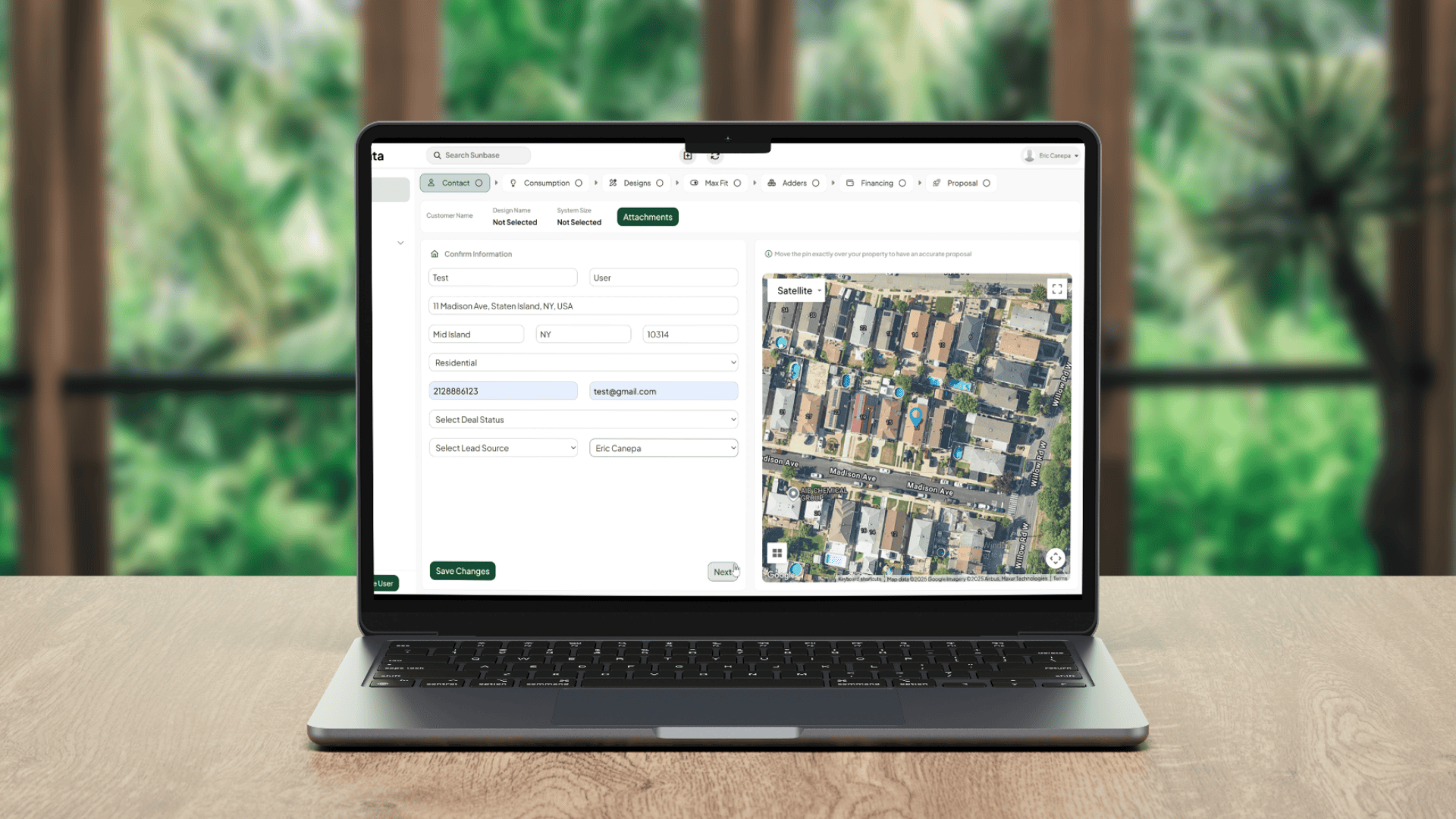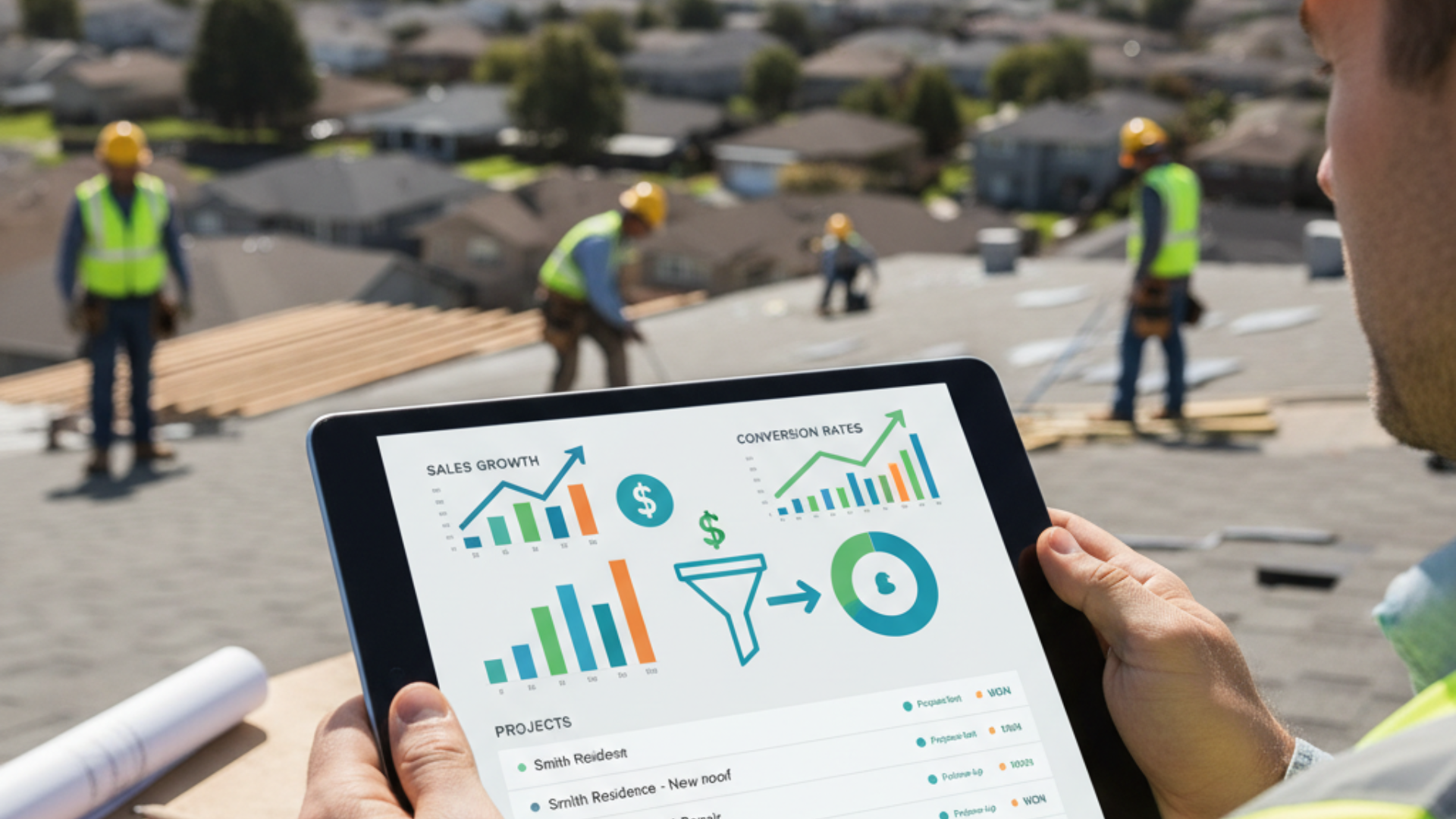September 9, 2025
Audio overview: Listen & Learn
Managing a construction business means wearing many hats - chasing new leads, keeping clients updated, tracking jobs, sending invoices, and ensuring every project stays on schedule.
A construction CRM brings all of that into one place. The right tool keeps your projects organized, your team in sync, and your clients happy without adding extra headaches.
In this guide, we’ll walk through five features of construction CRM that can help small contractors work smarter, win more jobs, and keep every project running smoothly from start to finish.
The 5 Most Essential Features Of Construction CRM Every Small Contractor Needs in 2025
The right customer relationship management tool is designed for how contractors work: fast-moving, deadline-focused, and often away from the office.
Therefore, these five features of construction CRM for small businesses will help you stay on top of every lead, project, and payment, so nothing slips through the cracks.
Key Takeaways
- Construction firms need a tool that helps them organize projects, manage clients, and track revenue in one place.
- Construction-focused crm software increases lead conversion, eases document management, and keeps project timelines on track.
- The best construction CRM software includes features like a centralized contact management system, project tracking, automated lead management, and construction-specific workflows.
- A CRM built for construction businesses saves time, reduces errors caused by manual data entry, and makes day-to-day operations more efficient.
Why Small Construction Businesses Need a CRM in 2025
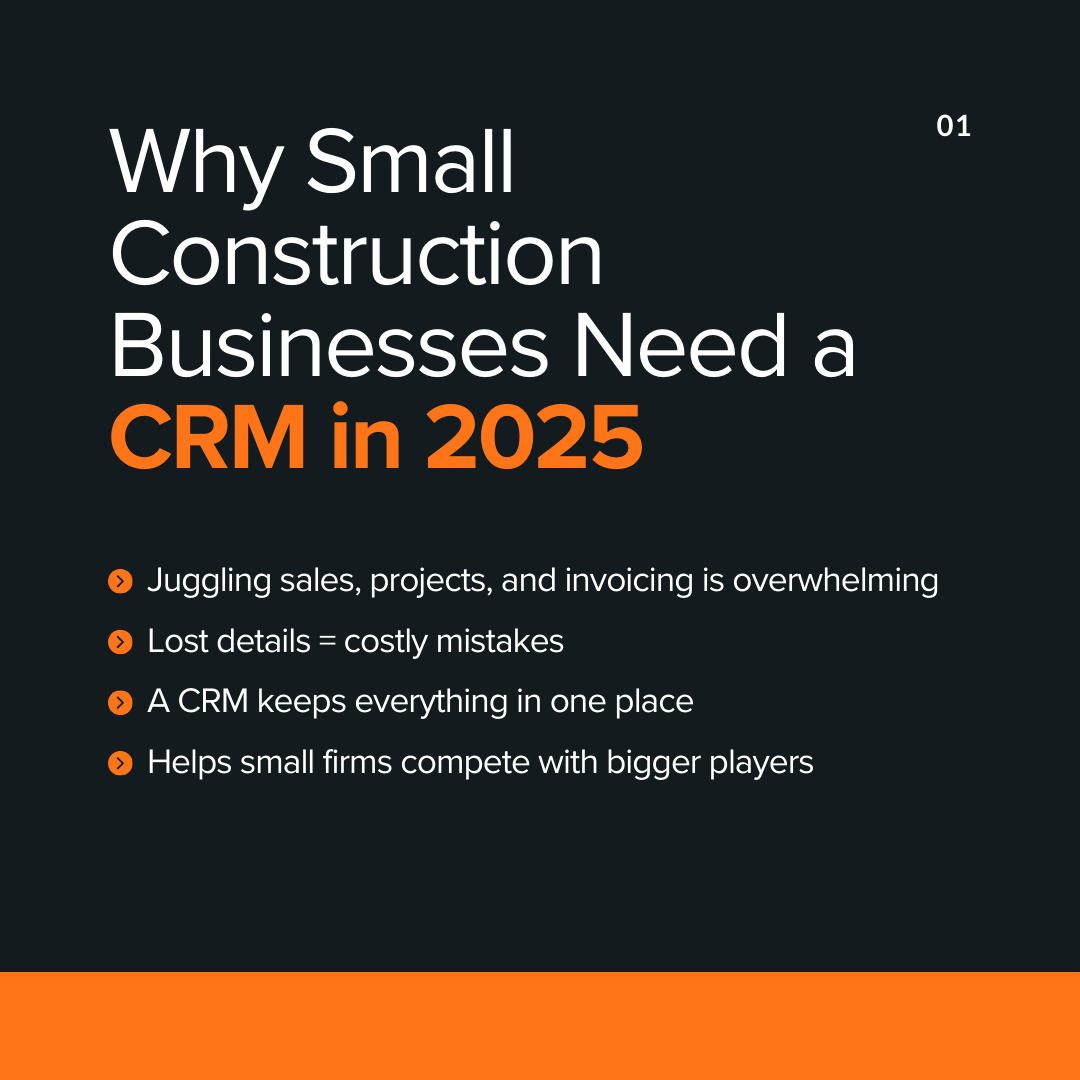
Project management tools help construction professionals stay organized, meet deadlines, and win repeat business.
In a competitive market, CRM for construction can be the difference between smooth operations and constant firefighting.
1. Manage Multiple Roles in One System
Small contractors often handle sales, project management, client updates, and invoicing by themselves. A CRM combines all these functions into a single platform, so you’re not bouncing between spreadsheets, email threads, and paper notes.
2. Centralize Project and Client Information
A construction CRM stores all job details, client contacts, proposals, and contracts in one dashboard. So, whether you’re in the office or on-site, you can quickly check project status, upcoming deadlines, or a client’s preferences without digging through files.
3. Reduce Errors and Missed Opportunities
When every conversation, quote, and task is logged, there’s less risk of forgetting a follow-up, sending the wrong estimate, or ordering incorrect materials. This improves efficiency and keeps clients satisfied.
4. Stay Competitive in a Growing Market
The construction industry in 2025 is more competitive than ever. Therefore, opting for a CRM can make all the difference. A CRM helps smaller firms match or even outperform larger companies by keeping processes tight, communication clear, and jobs moving forward.
Also read: The Overlooked Benefits of CRM for the Construction Industry
Feature #1 – Centralized Client Details & Contact Management
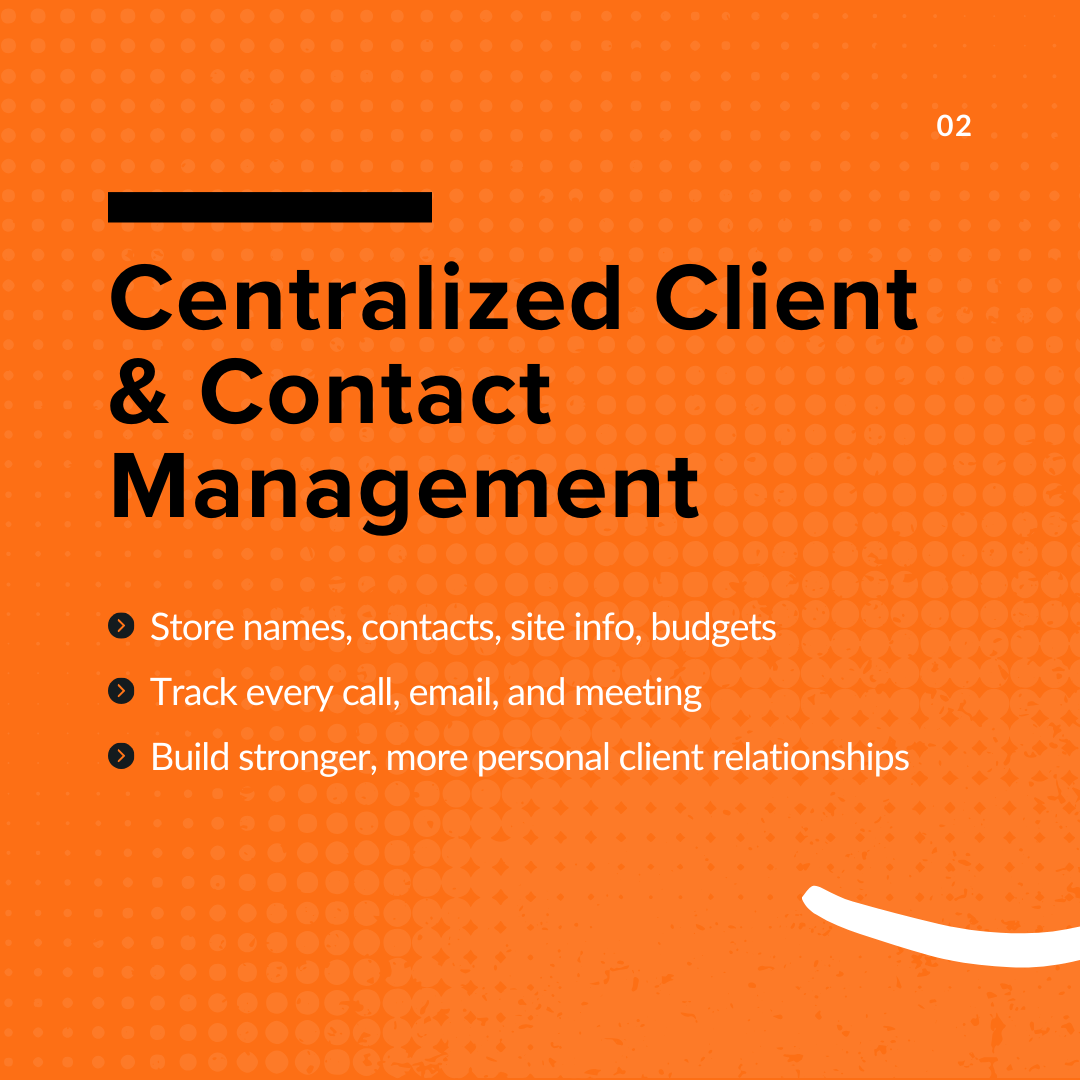
Keeping all client information in one place is the foundation of any good construction CRM for a small business. It ensures you have instant access to contacts, job history, and communications, so you can run your construction projects without wasting time hunting for details.
1. All Client Info in One Place
A CRM acts as your master directory that makes managing client relationships easier.
It stores names, phone numbers, email addresses, site locations, and even custom fields like preferred materials or budget range.
Instead of searching through spreadsheets, you can pull up a client’s full profile in seconds, whether you’re in the office or on-site.
2. Track Every Interaction
Every conversation, email, meeting, and quote is recorded automatically. This history helps you see exactly when a lead was last contacted, what was discussed, and what the next step should be.
This means fewer missed follow-ups and a smoother handover if someone else needs to step in.
3. Build Stronger Relationships
Clients remember contractors who remember them. With a clear record of past projects, timelines, and preferences, you can personalize every interaction, from greeting them by name to referencing the last job you did together.
This makes customer management smoother and increases your chances of getting referrals.
Feature #2 – Project and Task Tracking for Ongoing Jobs
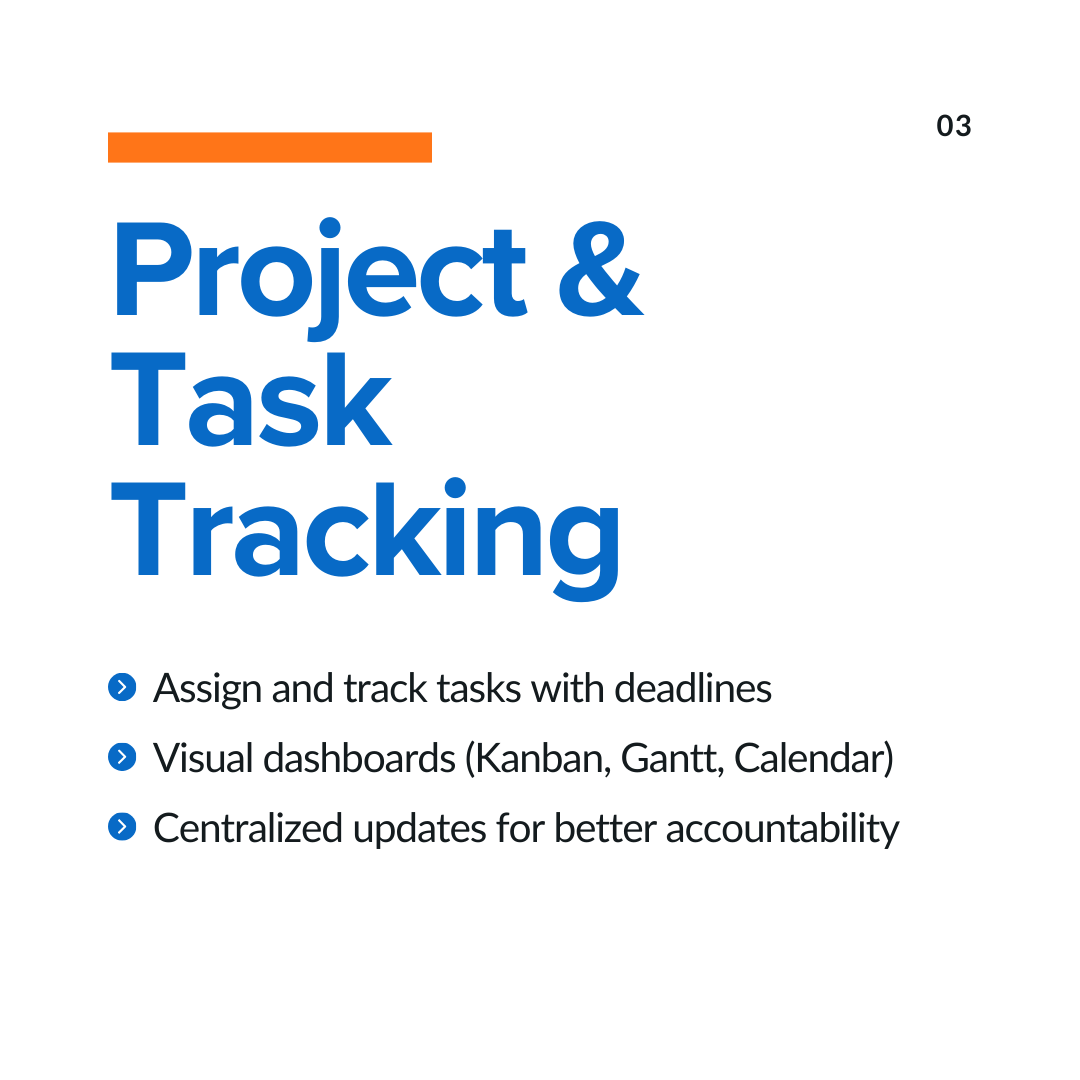
Project and task tracking in construction companies is essential for keeping every job organized from start to finish. It gives contractors a clear view of deadlines, responsibilities, and progress, ensuring projects stay on schedule and within budget.
1. Monitor Multiple Jobs at Once
With effective task management built into the CRM, you can assign work, set deadlines, and track completion without managing multiple tools. This ensures every crew member knows their responsibilities and projects stay on schedule.
A. Visual Dashboards and Smart Automations
- Visual Dashboards make data easy to understand and act on. With Gantt charts, Kanban boards, or calendar views, you can see exactly where every job stands at a glance.
- Automations take it a step further. With built-in sales pipeline tracking, you can monitor deals from initial lead to completed job, spot issues, and use automations to keep momentum going without constant manual updates.
2. Assign and Track Tasks
A good construction CRM lets you assign tasks to team members or subcontractors, set due dates, and monitor completion. This ensures everyone knows their responsibilities and keeps work moving without delays.
3. Centralize Project Updates
Instead of relying on scattered texts and calls, updates are logged directly in the construction crm software. This means you can check progress, material deliveries, and site issues in one place, even when you’re away from the office.
4. Improve Accountability
When tasks and timelines are visible to everyone involved, there’s less room for missed deadlines or confusion over who’s responsible. This transparency keeps projects running efficiently and clients satisfied.
A good CRM keeps all your CRM project details in one place, from site addresses and schedules to assigned tasks and material orders. This makes it easy to check progress and update information in real time.
Check out: How Construction CRM Enhances Customer Relationships?
Feature #3 – Integrated Communication Tools
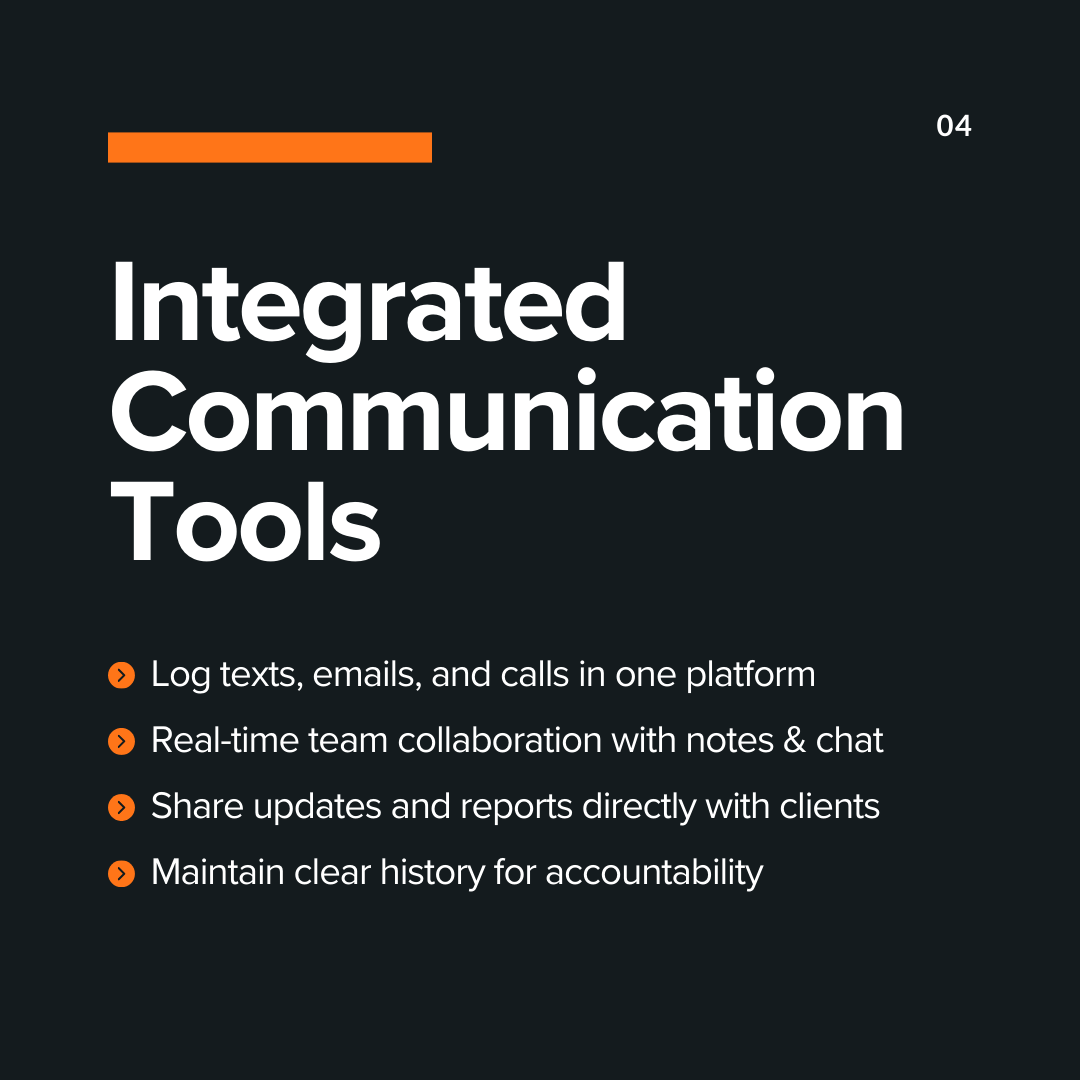
Integrated communication tools in a construction CRM for small businesses keep every message, update, and document in one place. This improves collaboration between your team, subcontractors, and clients, ensuring that important details aren’t lost.
1. Keep All Conversations in One Platform
Instead of juggling texts, emails, and calls, a CRM logs every interaction in a central location. This means you can review past messages, see decisions made, and avoid repeating questions or missing approvals.
2. Collaborate with Your Team in Real Time
In-app chat, comment threads, and shared notes let teams discuss tasks directly within the project they’re working on. This keeps communication relevant and eliminates the need to search through unrelated conversations.
3. Maintain Clear Client Communication
Clients can receive updates, photos, or status reports directly from the CRM. This keeps them informed without requiring multiple follow-ups and maintains their confidence in your work.
4. Document Everything for Accountability
Having a complete communication history helps resolve disputes and misunderstandings. You can confirm what was agreed upon, when changes were requested, and who approved them, protecting your business if conflicts arise.
Feature #4 – Lead Management and Pipeline Automation
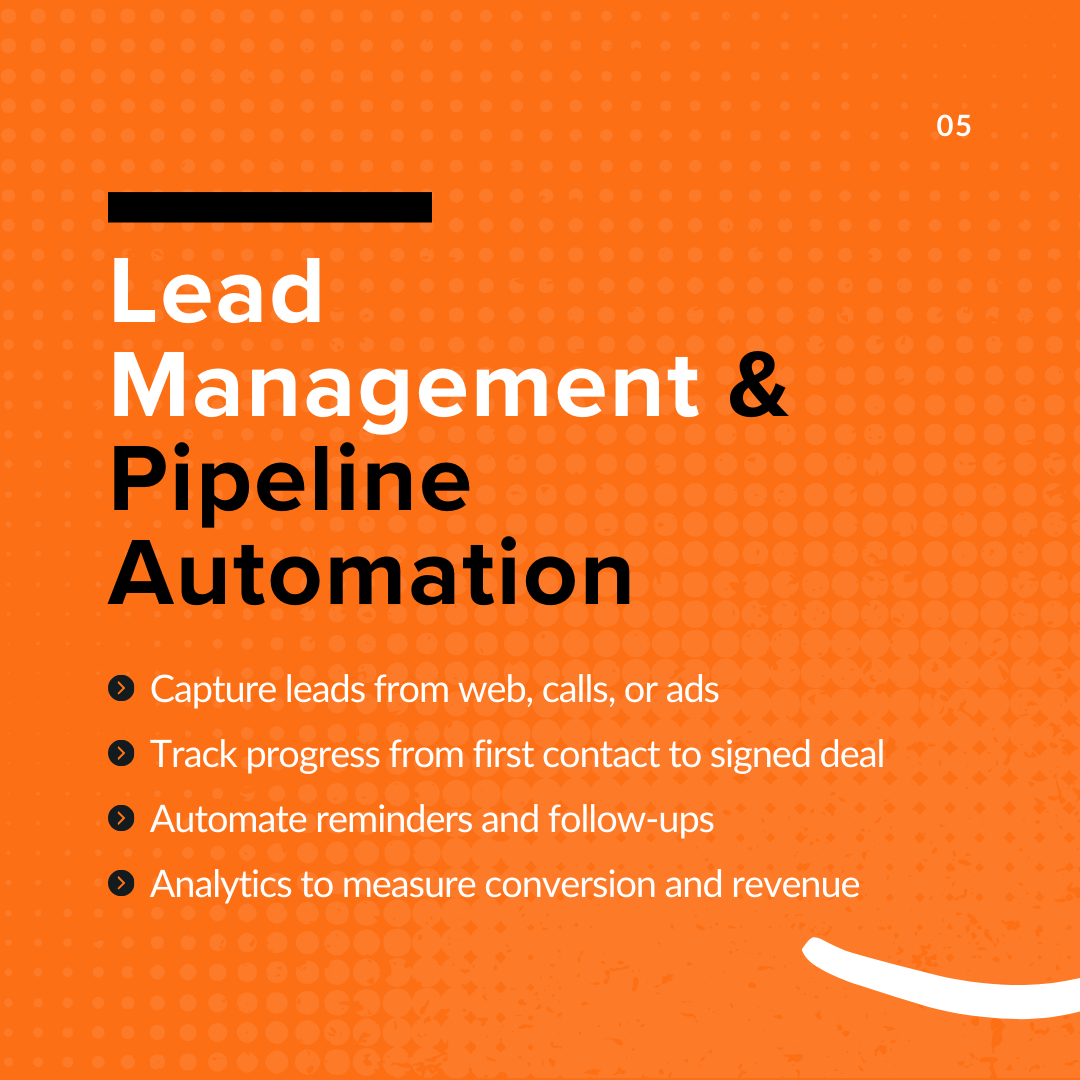
From the first contact to a signed contract, your builder's pipeline should give you a clear view of every opportunity. With a construction CRM, you can see exactly where each prospect stands, which ones need follow-ups, and which ones are ready to close.
1. Capture Leads from Multiple Sources
A CRM can collect leads from website forms, phone calls, social media, or ad campaigns. All inquiries are stored in one system, so you never lose track of a potential client.
2. Track Every Stage of the Sales Process
From the initial stage, pipeline views show where each lead stands. You can quickly identify which deals are nearing completion and which require follow-up, allowing you to prioritize your efforts effectively.
3. Automate Follow-Ups
Instead of manually remembering when to call or email, automation tools send reminders or schedule follow-ups automatically. This keeps leads engaged and improves your chances of conversion.
4. Measure Performance Over Time
Pipeline reports show how many leads are converting, the average time to close a deal, and where bottlenecks happen. This data helps you refine your sales process and focus on the most effective strategies.
A. Reporting and Analytics for Better Decisions
- Data can tell you what’s working and what’s slowing you down. A strong CRM gives you reports on lead conversion rates, job profitability, overdue invoices, and even forecasted revenue.
- These insights help you make smarter choices when deciding where to focus your marketing, when to schedule more crews, or which jobs bring in the best returns.
Feature #5 – Customizable Workflows Built for the Construction Industry
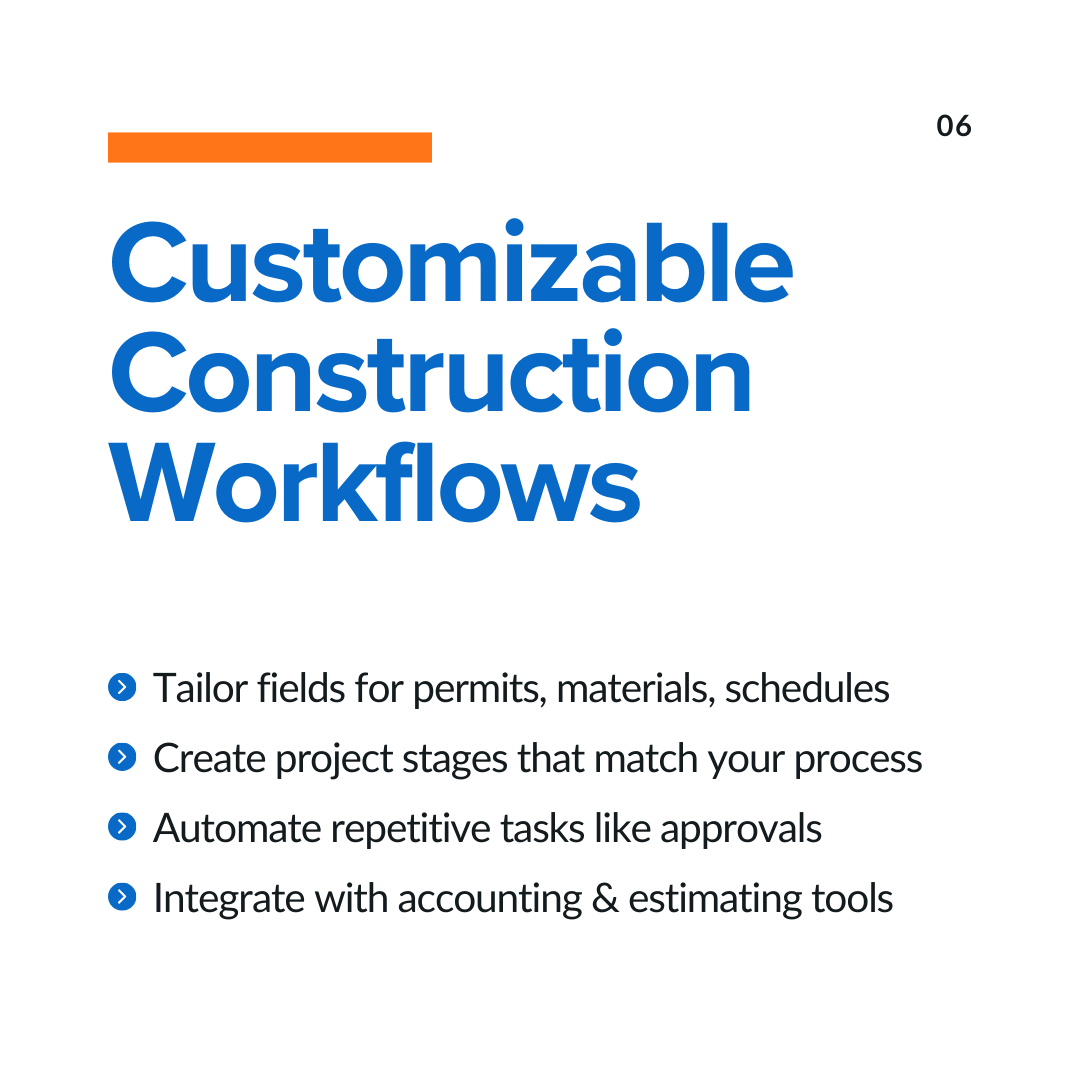
Customizable workflows in a construction CRM for small businesses let you adapt the system to match how your projects run. This ensures the CRM supports your processes, rather than forcing you to work around rigid templates.
1. Tailor Fields and Forms to Your Needs
Construction businesses often need to track details such as site addresses, permit statuses, material orders, or equipment schedules. A customizable CRM lets you create specific fields and forms that capture exactly what matters for your jobs.
2. Build Project Stages That Match Your Process
Instead of generic “to-do” lists, you can set up stages that mirror your workflow from bid submission and contract signing to material delivery and final inspection. This makes progress tracking more accurate.
3. Automate Repetitive Tasks
You can set the CRM to trigger actions when certain conditions are met, like sending a reminder to order materials after a bid is approved. Automation keeps work moving without constant manual input.
4. Integrate with Tools You Already Use
Many construction CRMs also integrate with estimating tools, accounting software, and project management systems you may already use, allowing data to flow seamlessly across platforms without double entry. This avoids duplicate data entry and keeps everything in sync.
Check out: Top 7 Tools Every Construction Manager Needs for Efficient Project Management
Bonus Feature – Mobile-Friendly Access for On-Site Convenience
Mobile access in a construction CRM for small businesses lets contractors manage projects, update records, and communicate with their team while on the job site. This ensures important tasks don’t get delayed until you’re back in the office.
1. Work From Anywhere
A mobile-friendly CRM lets you check schedules, client details, and project updates from your phone or tablet. This flexibility keeps you connected even during job sites.
2. Capture Information in Real Time
You can log notes, upload photos, or update task statuses instantly, reducing the risk of forgetting details or losing paperwork.
3. Respond to Clients Faster
Being able to reply to client questions, send updates, or approve changes on the spot keeps jobs moving and clients satisfied.
Choosing the Best Construction CRM Software for Your Business
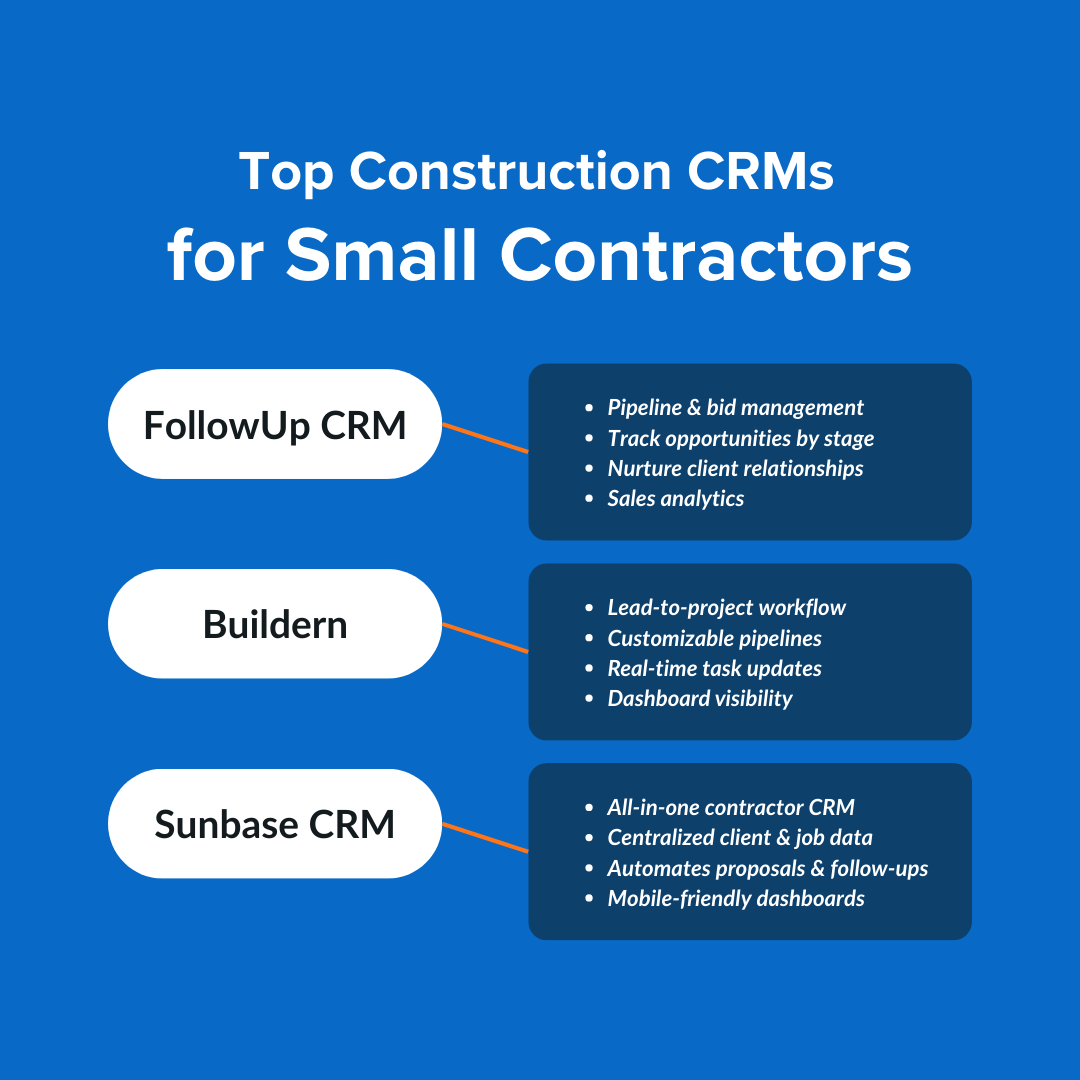
The best construction CRM for small businesses is one that’s easy to use, fits your budget, and includes the features you’ll use daily. Here are some options:
1. FollowUp CRM
FollowUp CRM is well known for its focus on pipeline management and the bid process, providing tools that specifically help sales reps:
- Track opportunities and bids throughout different stages.
- Manage and nurture client and contractor relationships.
- Boost sales performance with robust reporting and analytics features.
- Generate and send proposals directly from the platform to streamline the bidding process.
- Digital bid calendar and scheduling to plan, track, and manage bids efficiently.
- Track every email interaction with leads to maintain comprehensive communication records.
2. Buildern
Buildern is well known for its comprehensive lead-to-project workflow tailored for contractors, providing tools that specifically help construction professionals:
- Capture leads and manage customizable sales pipelines to track progress.
- Oversee project and task management with real-time updates and task assignments.
- Gain full visibility across sales and project completion through integrated dashboards.
- Streamline communication and automate workflows to improve efficiency throughout the construction lifecycle.
- Manage budgets and track expenses to ensure projects stay on budget and avoid overruns.
- Generate detailed reports and analytics to monitor project performance and sales insights.
- Mobile app for on-the-go project management and field updates.
- Receive automated notifications and alerts for deadlines, approvals, or critical updates.
3. Sunbase Construction CRM
Sunbase Construction CRM is well known for being an all-in-one CRM and project management solution designed specifically for contractors, providing tools that specifically help professionals:
- Centralize client, lead, and project information, and connect all communications and job details in one platform for streamlined tracking.
- Automate proposals, contracts, estimates, follow-ups, and document management to save time and reduce errors.
- Access sales performance and project outcome analytics with robust, customizable dashboards and reporting features.
- Enable mobile access for field and sales teams to manage client interactions, tasks, project updates, documents, and schedules in real time.
Look for CRMs that support scheduling, client records, invoicing, and financial management, so you have a full picture of your business in one place.
Conclusion
A construction CRM can transform how you manage leads, projects, and client relationships. The right software centralizes your work, improves communication, and reduces errors, helping you stay competitive in a fast-moving industry.
If you’re a small contractor looking for a CRM that’s simple, affordable, and built to streamline your entire business without adding complexity, Sunbase checks every box.
It’s designed to give you the control you need, from lead capture to project completion, with the flexibility to grow alongside your business.
About Sunbase
Trusted by contractors across the construction industry, Sunbase is built for how small businesses work. Book your demo today and make project management simple, fast, and stress-free.
FAQs
Q1: Can I use a CRM if I’m a solo contractor?
Yes. Even solo contractors benefit from a CRM by keeping all leads, client details, and project information organized in one place.
Q2: How much does a construction CRM typically cost?
Prices vary from free basic plans to paid versions starting around $20–$50/month, depending on features.
Q3: What’s the difference between general CRMs and construction-specific CRMs?
Construction-specific CRMs include industry-tailored features like project tracking, job site details, and material order management that general CRMs lack.
Q4: Is it hard to switch from spreadsheets to a CRM?
Most CRMs offer import tools and onboarding support to help migrate your data quickly.
Q5: How long before I see results from using a CRM?
Many contractors notice improved organization and fewer missed opportunities within the first few weeks of consistent use.
One Platform. Zero Chaos. Run Your Entire Business in One Place.
Sunbase replaces your CRM, proposals, scheduling, job tracking, and reporting tools — all inside one clean, connected platform.
About Sunbase
The All-In-One Platform to Run Your Entire Business
Sunbase helps you organize operations, streamline daily workflows, and manage everything - from first customer contact to final project deliver- in one connected system.
Our Mission
- Organize your business.
- Optimize your workflow.
- Automate what slows you down.
Why Businesses Choose Sunbase
One Connected Workflow
Replace scattered tools and manual processes with a single platform that brings together your team, tasks, customers, jobs, and performance data.
🌎 Global Presence
Serving the United States, Canada, India, LATAM, Australia, and 10+ international markets.
👥 11,000+ Users
Trusted by contractors, installers, project managers, sales teams, and field technicians.
🏗️ Built for All Sizes
From small contracting teams to fast-growing enterprises, Sunbase adapts to your workflow.
Useful Links For You
Stop Managing Your Business Manually. Automate It.
Sunbase automates workflows, reduces mistakes, and helps your team get more done - without hiring extra staff or juggling multiple tools.



